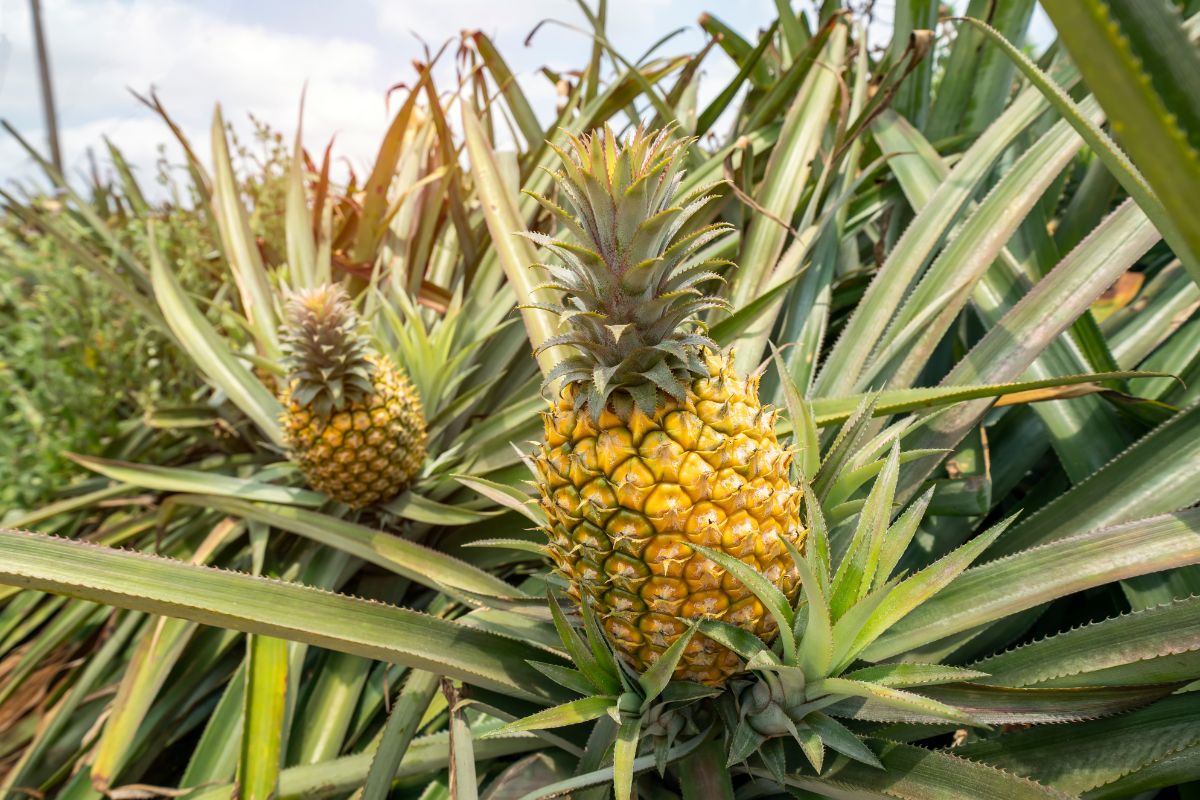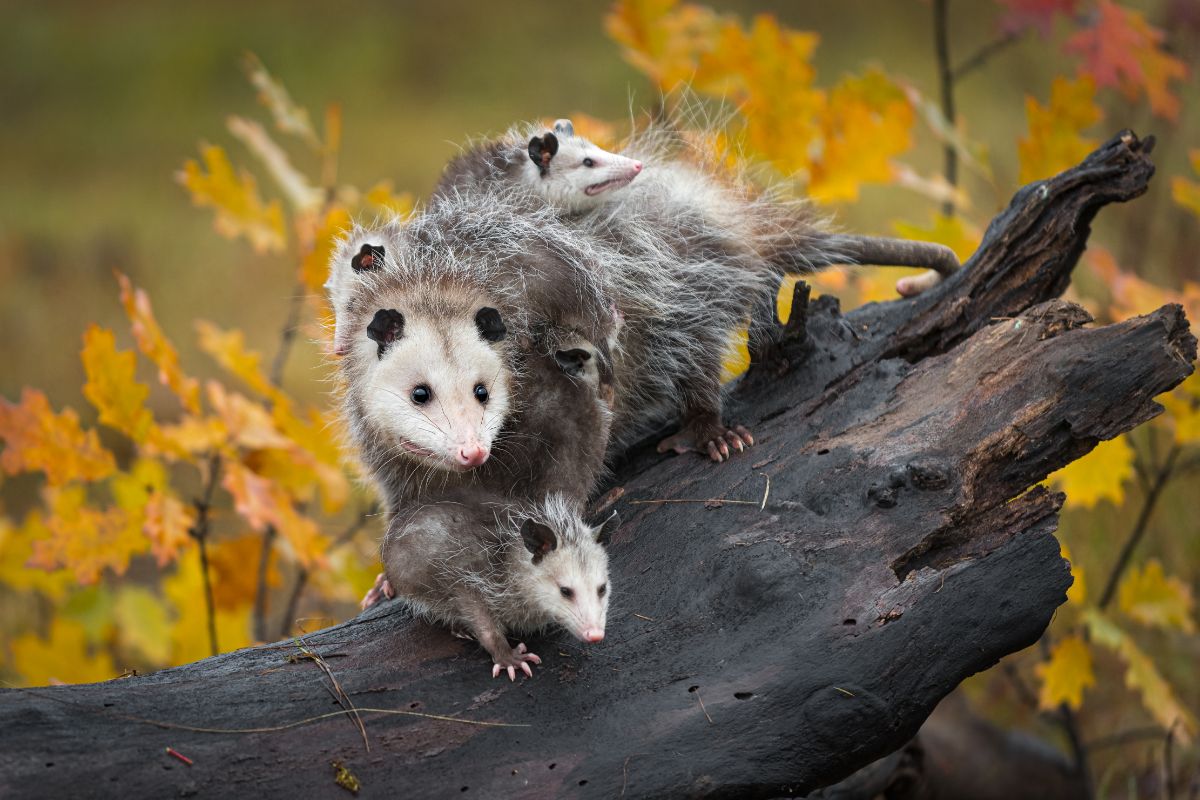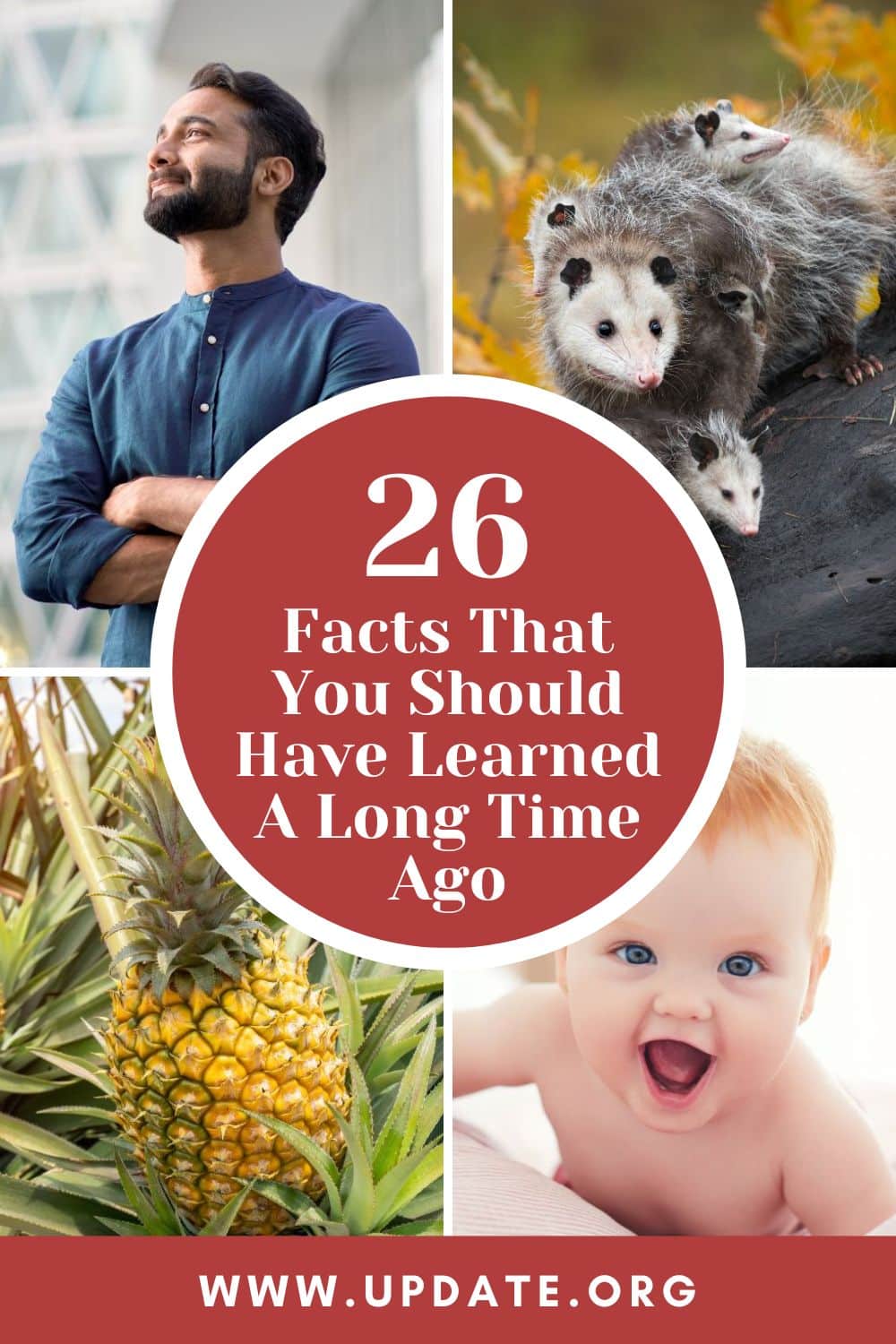Ever stumble upon a startling fact that makes you wonder how it never crossed your path before? This collection is brimming with facts that you should have learned a long time ago - 26 of them, to be precise. Each one peels back a layer of the ordinary, uncovering surprises in the mundane and shedding new light on the overlooked.

From the quirks of nature to little-known historical truths, these facts are like hidden treasures in the vast sea of knowledge, waiting to pique your curiosity and enrich your understanding.
Jump to:
- 1. Infants Shouldn't Drink Water
- 2. Dishwasher Filter Upkeep is Essential Maintenance
- 3. There Are Rare Cases Of Twins With Different Dads
- 4. Ancient Octopuses Predate the Dinosaurs
- 5. The Silent Mind: Life Without Internal Monologue
- 6. The Reversibility Of Percentages
- 7. The Illusion of Wetness: Skin’s Secret
- 8. Iron Boost From Cast-Iron Cooking
- 9. The Misconception of Driving With Interior Lights
- 10. Pineapples Do Not Grow On Trees
- 11. iPhone Calculator’s Swipe to Delete
- 12. There Are People Who Can’t Visualize Objects Or Images In Their Minds
- 13. The Start of the Menstrual Cycle: Day 1 of Flow
- 14. Our Galactic Joyride Through Space
- 15. The Misdirected Assassination Attempt on FDR
- 16. Water’s Weight: A Liter Equals A Kilogram
- 17. The Misnamed “Spanish Flu” Pandemic
- 18. The Citrus Collaboration: Lemons are a Hybrid Fruit
- 19. Health Benefits Of Masturbation
- 20. Opossums: Nature’s Pest Controllers
- 21. Tea Diversity: One Plant, Many Flavors
- 22. The Recent End Of The Holy Roman Empire
- 23. Puffer Fish’s Watery Defense
- 24. Mario’s Secret Continuation Trick
- 25. Erasing Permanent Marker With Dry Erase Marker
- 26. Oxen Are Trained Work Cattle
1. Infants Shouldn't Drink Water

Babies under six months should avoid water. Their immature kidneys and small bodies aren't equipped to handle it, potentially leading to water intoxication and nutrient loss.
Breast milk or formula is sufficient for their hydration and nutrition. These are specifically designed to cater to an infant's developmental needs, ensuring they get the right balance for healthy growth.
2. Dishwasher Filter Upkeep is Essential Maintenance
Neglecting your dishwasher’s filter can lead to subpar cleaning. This crucial component traps food debris, requiring monthly cleaning to function optimally. Think of it as a monthly check-up to ensure your dishes always come out sparkling. A little effort goes a long way in maintaining your dishwasher’s health and efficiency.
3. There Are Rare Cases Of Twins With Different Dads
In the fascinating world of genetics, there’s a rare phenomenon where twins can have different fathers, known as “heteropaternal superfecundation.” This happens when two eggs are released and fertilized by sperm from different fathers. It’s like a genetic lottery where fraternal twins end up being more like half-siblings. This rarity showcases the complexity and wonder of human reproduction, akin to finding a gem in the vast treasure of genetics.
4. Ancient Octopuses Predate the Dinosaurs
The discovery of a 330-million-year-old octopus ancestor suggests that these mysterious sea creatures were around even before dinosaurs roamed the Earth. This ancient cousin, with ten limbs and a sign of an ink sac, pushes back octopus lineage significantly. It’s akin to finding an old family album that reveals ancestors from bygone eras, reshaping our understanding of the family tree - in this case, the evolution of the octopus.
5. The Silent Mind: Life Without Internal Monologue

Imagine a world where thoughts are silent, with no internal voice narrating life’s moments. This is the reality for those with absent internal monologue. Their cognitive process is more about feeling and knowing than hearing words in their head, offering a unique, quieter perspective on thought and experience.
6. The Reversibility Of Percentages
Percentages, though seemingly complex, are actually quite straightforward due to their reversible nature. This means the order in calculating percentages doesn’t matter, making them user-friendly and accessible. It’s like a two-way street in mathematics, where you can go either way and still reach the same destination. This reversibility simplifies many calculations, demystifying a concept that can often seem daunting.
7. The Illusion of Wetness: Skin’s Secret
Our skin’s inability to directly sense wetness is a curious biological fact. Instead, our brain interprets other cues like temperature and touch to create the sensation of wetness. It’s a sensory illusion, a brain trick that we often take for granted. This understanding has practical applications in product design, influencing how we perceive and interact with everyday items. It’s a reminder of the complex and sometimes deceptive nature of our sensory experiences.
8. Iron Boost From Cast-Iron Cooking
Cooking with cast-iron skillets isn’t just about tradition or even taste–it’s a stealthy way to up your iron intake. Foods, especially acidic ones like tomato sauce, absorb iron from the skillet, turning a simple meal into a nutritional powerhouse. It’s like having a personal nutritionist tweak your meals for the better, all with a simple change in cookware.
9. The Misconception of Driving With Interior Lights
The belief that it’s illegal to drive with interior lights on is more myth than law. While not against the rules, it can be unsafe, reducing visibility and potentially distracting other drivers. It’s a well-intentioned misconception, highlighting the importance of safety over legality in driving practices.
10. Pineapples Do Not Grow On Trees

Pineapples are surprise packages in the world of botany, growing not on trees but from the center of a leafy plant. Each pineapple is a collective masterpiece of 100 to 200 flowers fused together, requiring just the right mix of sunny days and optimal temperature. It’s like a complex dance of nature, where every step from soil to sunshine must be perfectly aligned to create this tropical delight.
11. iPhone Calculator’s Swipe to Delete
The iPhone calculator harbors a neat trick: a simple swipe to delete the most recent digit. This feature is like having an undo button for minor slip-ups, sparing users the frustration of starting over for a small error. It’s akin to having a forgiving backspace key in a world where every keystroke counts, making numerical inputs less of a hassle and more intuitive.
12. There Are People Who Can’t Visualize Objects Or Images In Their Minds
Aphantasia, the inability to visualize mental images, is a fascinating phenomenon affecting a small percentage of the population. For those with Aphantasia, the mind’s eye is blind, turning tasks like recalling faces or visualizing book scenes into challenges. It’s akin to having a theater of the mind where the screen remains perpetually blank, altering the way memories and imaginations are experienced and shared.
13. The Start of the Menstrual Cycle: Day 1 of Flow
A menstrual cycle is not a countdown but a count-up, beginning from the first day of the period. It’s like resetting a stopwatch at the start of a race; each cycle’s length varies, but the starting point is always the first day of bleeding. Understanding this can be crucial for tracking fertility or managing period-related health.
14. Our Galactic Joyride Through Space
Our solar system is on a high-speed journey, racing through the Milky Way at a staggering 200,000 miles per hour. It’s like being on an invisible cosmic highway, where planets and stars are vehicles moving at unimaginable speeds. This celestial speed underlines our exhilarating yet minuscule presence in the vast expanse of the universe, a galactic joyride that puts even the fastest earthly travels to shame.
15. The Misdirected Assassination Attempt on FDR

In 1993, an assassination attempt on President Franklin D. Roosevelt took a tragic turn, missing him but killing Chicago’s mayor. This event is a stark reminder of the unpredictability and far-reaching consequences of such violent acts. It underscores the fragility of historical moments, where a single misaimed shot can dramatically alter the course of multiple lives and political landscapes.
16. Water’s Weight: A Liter Equals A Kilogram
One liter of water has a neat correspondence to weigh, tipping the scale at exactly one kilogram. This simple yet fascinating fact about water’s density is a fundamental principle in science, offering a clear and practical understanding of mass and volume. However, this weight can vary slightly with temperature changes, adding a subtle twist to this otherwise straightforward relationship.
17. The Misnamed “Spanish Flu” Pandemic
The infamous “Spanish Flu” was a misnomer born out of wartime media censorship. Originating likely in Kansas, it spread rapidly during WW1, but Spain, being neutral and uncensored, was the first to report extensively on it. This historical quirk of naming highlights the power of media and public perception, where a name can mislead generations about the true origins of a global crisis.
18. The Citrus Collaboration: Lemons are a Hybrid Fruit
Lemons, those zesty fruits we often take for granted, are actually a masterful blend of citrons and bitter oranges. This hybrid, crafted by centuries of agricultural artistry, is a true testament to human influence on nature. Imagine waiting three to five years for a lemon tree to fruit, only for it to burst into a lemon bonanza, yielding up to 1,500 lemons in a season.
19. Health Benefits Of Masturbation
Masturbation isn’t just a taboo subject; it offers real health benefits. Regular self-pleasure can lower blood pressure and reduce stress, functioning as a form of low-impact cardiovascular exercise. Surprisingly, it’s also linked with higher intelligence, showcasing a connection between sexual well-being and mental acuity. It’s a natural, healthy activity with positive effects on both physical and mental health.
20. Opossums: Nature’s Pest Controllers

Opossums, often misunderstood, are actually environmental heroes. These nocturnal nomads roam around, munching on unwanted pests like ticks and rodents, acting like nature’s own pest control service. They’re like the secret agents of the animal world, quietly keeping our gardens and homes free from Lyme disease carriers and unwanted critters, all while asking for nothing in return but peaceful coexistence.
21. Tea Diversity: One Plant, Many Flavors
The world of tea is a kaleidoscope of flavors originating from the Camellia Sinensis plant. The transformation from leaf to your favorite cup of black, green, white, oolong, or pu-erh tea is a journey of geography, climate, and crafty processing. It’s like a single actor playing multiple roles in a movie, each performance unique yet stemming from the same source.
22. The Recent End Of The Holy Roman Empire
The Holy Roman Empire, often associated with distant medieval times, actually met its demise relatively recently, just around 300 years ago. This extended timeline challenges common perceptions, placing the empire’s fall within a more modern context and highlighting the proximity of historical events that we often consider ancient.
23. Puffer Fish’s Watery Defense
Pufferfish, the underwater Houdinis, don’t inflate with air but with water. They gulp water and pump it into their stomachs to balloon up a clever survival trick. It’s like a nature-engineered waterbed, expanding to deter predators. This aquatic sleight of hand challenges our balloon-like assumptions about these fascinating sea creatures.
24. Mario’s Secret Continuation Trick
In the iconic world of Super Mario Bros. on the NES, losing a life isn’t the end. By pressing A+Start on the main screen, players can continue from where they last left off. This hidden feature is like discovering a secret passage in a familiar building, offering a second chance to conquer those pesky Goombas and Koopa Troopas.
25. Erasing Permanent Marker With Dry Erase Marker

Have you ever accidentally used a permanent marker on a whiteboard? Simply overlay it with a dry-erase marker and wipe it away. This clever hack utilizes the solvent properties of dry-erase ink to dissolve and remove the permanent marker, effectively turning a potential headache into an easy fix.
26. Oxen Are Trained Work Cattle
Oxen, often mistakenly thought to be a distinct species, are, in fact, cattle trained for labor. Typically steers over four years old, these bovines are the heavy lifters of the farm world. Any cattle breed can become an ox, but the transformation from a regular cow to a robust work animal involves specialized training, turning them into the farm's muscle for tasks like plowing and hauling.



